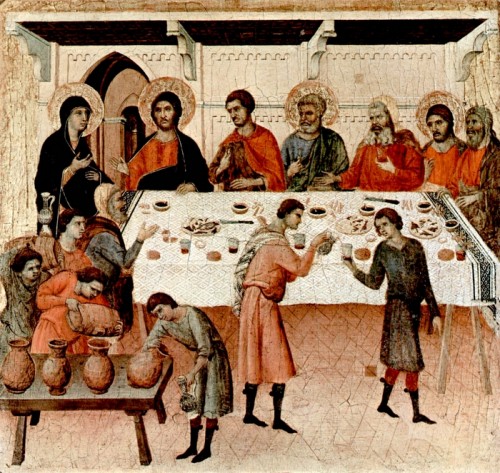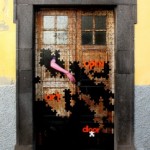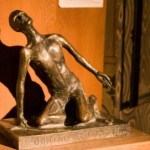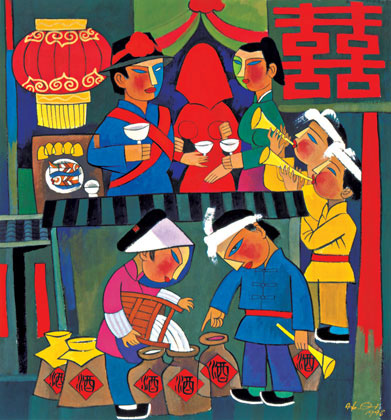 The Gospel of John is a book of signs. Each sign, each epiphany, emanates from Jesus. None comes from elsewhere. John says: he is the light of the world, and
The Gospel of John is a book of signs. Each sign, each epiphany, emanates from Jesus. None comes from elsewhere. John says: he is the light of the world, and
in him was light.
In John, there is no holy birth. The opening chapter is a preamble rather than a tale. There is no angel glow. No star in the sky, no majesties bearing gifts, no pregnant Mary declaring the Child’s purpose. In his preamble John simply declares Jesus’ light to be more ancient than any of this:
he was in the beginning with God . . . And then Jesus walks up to John the Baptist and is baptized, without any voice from heaven calling him Beloved. It is John who names him, calling him Lamb of God.
And then comes Cana: the wedding where Jesus changes water into wine. John’s signs are set in the course of ordinary human events. Ordinary events, that everyone knows. John asks us to see that the Word becomes flesh not by being wrapped in piety, or sacralized in magic, or shrouded in mystery, but in the midst of us, in the course of human events.
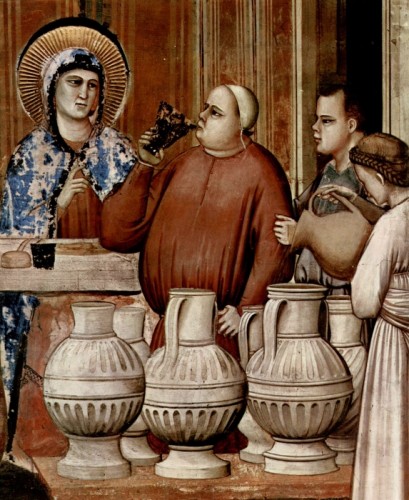 They have no wine. Mary seems to have come to this wedding alone. She is middle-aged, her son is in his thirties, and these are her first words in this gospel.
They have no wine. Mary seems to have come to this wedding alone. She is middle-aged, her son is in his thirties, and these are her first words in this gospel.
On the third day there was a wedding in Cana of Galilee, and the mother of Jesus was there, John tells us, and then: Jesus and his disciples were also invited. When the wine gave out, the mother of Jesus said to him, ‘They have no wine.’
Her first words. And they are a challenge. Judging by his response, they are an irritating challenge . He is annoyed, to say the least. Woman, what concern is that to you and to me? She is holding him responsible. Why?
The presumption that she wants to show off his special powers makes her seem like the stereotype in endless Jewish mother jokes, a pushy mother embarrassing her son into his first miracle. Wrapping this moment in pious solemnity does not eradicate that theme. And it does go against John’s emphasis, that signs occur in ordinary circumstances.
What else, then? Has the wine run out because Jesus brought more disciples than were expected, have they drunk too much?
Another reason, more consistent with the other signs in John’s gospel, and in keeping with John’s exact words, would be this: Mary cannot stand by and watch an injustice, will not watch the groom and his bride be disgraced; she does not want their marriage celebration to have a lasting shame as its memory. And in response to her compassion for them Jesus does what Mary, in her famous song in Luke’s gospel proclaimed: he fills the hungry with a good thing. He replenishes the wine.
Based on her need to stand against humiliation, the interchange between Mary and Jesus resembles the interchange between Rosa Parks and Martin Luther King, Jr, on an ordinary day in Montgomery. By refusing to give up her seat on the bus, or give in to one more instance of the humiliation of her people, Parks provoked a moment in history, and she provoked King’s entry into that moment as its vital wine and its transforming agent.
In their joint action his ministry to the nation (and the world) was opened. She declared that the moment was at hand. And he was not at first sure that this was, in fact, the right moment, but, somewhat reluctantly, he responded to her situation. And that response became the first of King’s unforgettable signs, moments of memorable light in a ministry in which he lived as John’s gospel says Jesus did, offering powerful signs in very ordinary human situations.
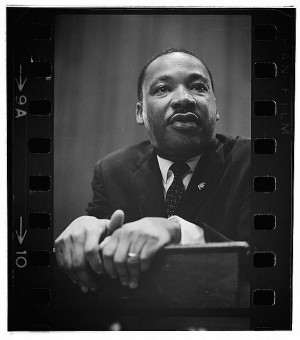 Jesus’signs will grow more stunning in John’s gospel. And so will King’s. For both men, the red thread connecting all their moments is compassionate justice, which reaches out to raise people from many kinds of death and shame.
Jesus’signs will grow more stunning in John’s gospel. And so will King’s. For both men, the red thread connecting all their moments is compassionate justice, which reaches out to raise people from many kinds of death and shame.
While Martin Luther King, Jr did not change water into wine, he did change words into the new wine of commitment. He did gather thousands to hear him, and they were fed; he did raise those whose lives were decaying in death, the garbage collectors; he did proclaim to the educated Nicodemuses of America that they needed to born again in mind and spirit; he did raise up the dead daughters of Birmingham, speaking of them in an unforgettable letter to the white clergy from the tomb of his jail cell in that city; he did lift up to us a cup of everlasting life, and we drink from it still.
I live in New Hampshire, the last state in America to hold out against recognizing the holiday honoring Martin Luther King, Jr. I live in a nation still deeply divided about race, still struggling to live out its central truth, that all men are created equal . . .
John’s gospel insists on this radical equality, all of us incarnating the Word, even as we all imbibe the good wine. The Book of Common Prayer bids us each night of our lives to pray that God’s spirit will . . . shield the joyous . . . which is what Mary and Jesus did at Cana. The prayer declares what Jesus and his mother knew, that the joyous are essential to the justice of this world.
We must learn to live together as brothers or perish together as fools. . . .
The hope of a secure and livable world lies
with disciplined nonconformists who are dedicated
to justice, peace, and brotherhood.
Martin Luther King, Jr.
from “Strength to Love”
___________________________________
Illustrations:
1. The Wedding at Cana, by He Qi, Nanqing, China.
Vanderbilt Divinity Library, Art in the Christian Tradition
2. Detail from The Wedding at Cana, Giotto di Bonadone, Scrovegni Chapel, c. 1304. Vanderbilt Divinity Library, Art in the Christian Tradition
3. Wedding at Cana, by Duccio di Buoninsegna, Museo dell Opera del Duomo, Sienna, Italy,circa 1308. Vanderbilt Divinity Library, Art in the Christian Tradition
4. Rev. Dr. Martin Luther King, Jr. Photo by Marion S. Trikosko. 1964. Source: Library of Congress. Image from Martin Luther King, Jr. site, images in the public domain.

